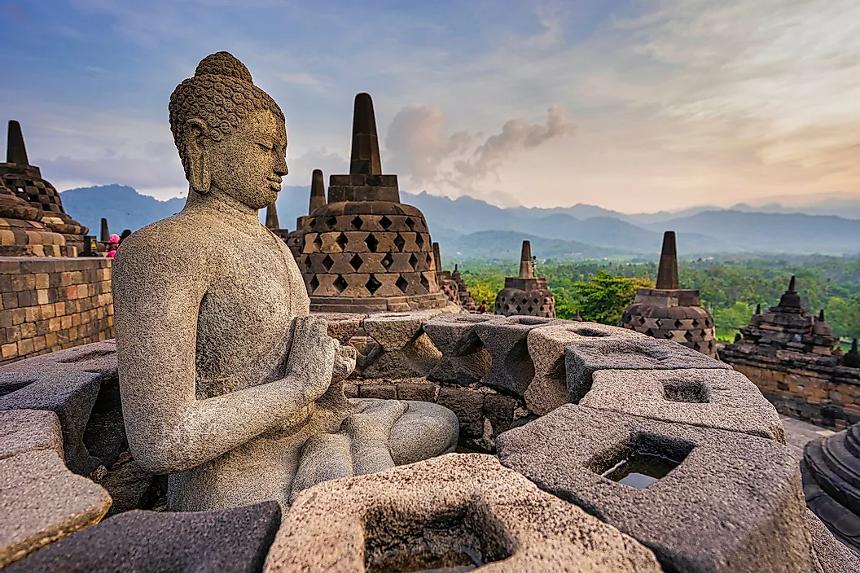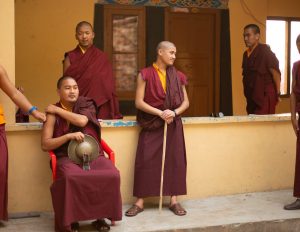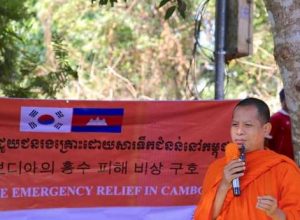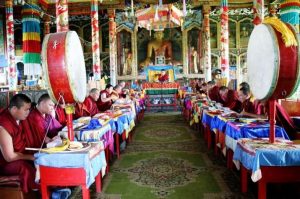
Buddhists in Indonesia have announced plans to celebrate the Buddha’s birth, or Vesak, at the iconic Borobudur temple this year. Events will take place on 14–15 May. The celebration follows two years without in-person celebrations due to the COVID-19 pandemic. Attendance numbers will be limited as part of ongoing precautions. The Vesak celebration this year is themed “The Road to Wisdom towards True Happiness.”
Tanto Soegito Harsono, the event coordinator for Vesak Day 2566—using the traditional Buddhist calendar—said yesterday: “Through the theme, we wish to portray the message that we must remain compassionate [to others] despite the pandemic, and we hope that through the compassion, we would be able to achieve true happiness.” He added: “This year, [Buddhists from] Walubi and Permabudhi will commemorate Vesak Day in Borobudur temple together after two years without public commemoration due to the pandemic.” (Antara)
Walubi is an acronym for Perwalian Umat Buddha Indonesia, or the All-Indonesia Federation of Buddhist Organizations. Founded in Jogyakarta in 1978, its purpose is to promote unity among Indonesia’s three million Buddhists. Permubudhi is the Indonesian Buddhist Association. It was founded in 2018 by Indonesia’s president, Joko Widodo, and serves as a communication forum for Buddhists of different backgrounds.
Harsono added: “We coordinated with the relevant institutions two days ago. [They instructed that] participants that could enter the first zone [of the temple] during the Vesak Day commemoration be capped at 1,200 people, with health protocols enforced.” (Antara)
Earlier celebrations took place on 7 May at various locations throughout the country. Buddhists took part in devotional practices in cemeteries in each of Indonesia’s provincial capitals.
“We had also organized another procession at the three temples of Mendut, Pawon, and Borobudur,” Harsono noted. (Antara)

Borobudur, located on the island of Java, is one of the world’s largest Buddhist structures. It was built in the ninth century, during the Sailendra dynasty, and exhibits many conventions of Gupta-influenced architecture. It thus serves as an example of the influence of Indian architecture in the region. Borobudur is situated on a hilltop, offering views of the green plains below. In 1991 it was designated a UNESCO World Heritage Site.
Indonesia is the world’s largest Muslim-majority country, with more than 230 million professed Muslims out of a total population of some 273 million as of 2020. The country is nonetheless a multicultural society in which Buddhism, Christianity, Confucianism, Hinduism, and various local indigenous religions are practiced freely. Islam has spread throughout Indonesia since the 13th century, adopting many of the country’s existing cultures and beliefs. Many of these include practices and beliefs stemming from Buddhism and Hinduism, both of which dominated at different times before the arrival of Islam.
While Indonesia is known for religious tolerance, there have been several high-profile cases of religious discrimination in recent years, as well as inter-religious violence, and mob destruction of religious structures. The authorities have thus advocated for greater inter-religious dialogue and activity to build communal harmony and peace in the country.
Last July, the government released plans to ensure the temple’s safety and desirability as a global tourist destination for Buddhists. Archaeologist Chaidir Ashari from the University of Indonesia said at the time: “Borobudur could share the same fate as the Buddha statues of Bamiyan in Afghanistan. Therefore it is very important for the security at Borobudur to be tightened at various sectors. Borobudur is an ancient monument whose existence can still be witnessed by Indonesian society. Should it be destroyed, it would be a huge loss.” (South China Morning Post)
Minister for Religious Affairs Yaqut Cholil Qoumas stated that the government hoped to promote events there “which can be attended by Buddhists [from] all over the world,” as part of efforts by the authorities to improve religious moderatism in the country. (South China Morning Post)
See more
Borobudur Temple to host Vesak Day commemoration (Antara)
Indonesia Plans Global Buddhist Site at Borobudur Temple (South China Morning Post)
Related news reports from BDG
The Buddha at Sea: Atlas of Maritime Buddhism and New Experiences in Museology
Indonesia Aims to Promote Borobudur as a Global Buddhist Travel Destination
The Resistance: Indonesian Women Moving Against Religious Intolerance
Reviving the Bhikkhuni Sangha in Indonesia: an Interview with Ayya Santini
Related features from BDG
Book Review: Monks in Motion: Buddhism and Modernity Across the South China Sea
Mahabhikksu Ashin Jinnarakkhita: The Father of Modern Indonesian Buddhism
Rediscovering an Ancient Heritage in Indonesia













namo buddhay!!!